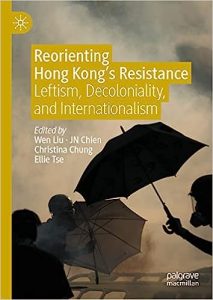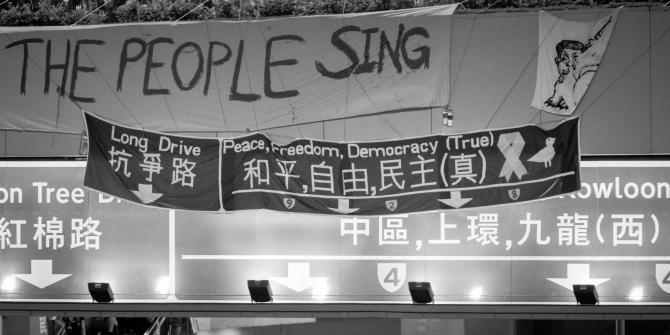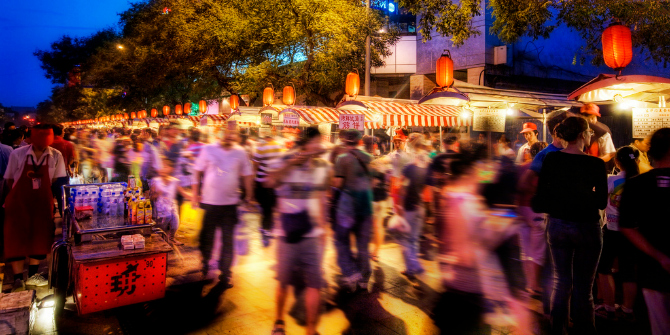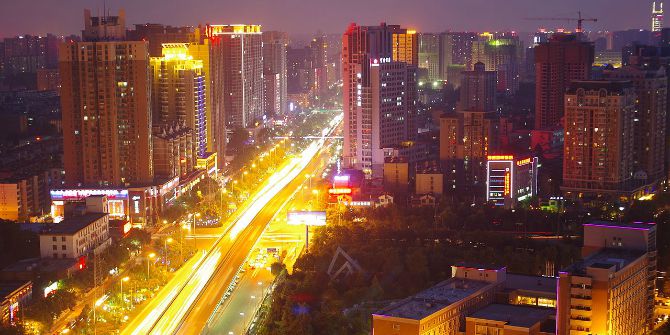+In Reorienting Hong Kong’s Resistance: Leftism, Decoloniality, and Internationalism editors Wen Liu, JN Chien, Christina Chung and Ellie Tse compile writing from activists and scholars on leftist and decolonial forms of resistance that have emerged from Hong Kong’s contemporary era of protests. The chapters in this important volume contextualise Hong Kong’s political struggles within historical and international contexts, including neoliberal tendencies in China, British colonial legacies, and global economic power struggles, writes Peter Lixuan Zhang.
Reorienting Hong Kong’s Resistance: Leftism, Decoloniality, and Internationalism. Wen Liu, JN Chien, Christina Chung and Ellie Tse (eds.). Palgrave Macmillan. 2022.
Find this book (affiliate link):![]()
 For people who know the vicissitudes of Hong Kong’s democratic movements, the traumatic memories of the 2019-2020 Anti-Extradition Law Amendment Bill Movement remain fresh. Its consequential enactment of Hong Kong National Security Law led to the dissolution of civil society. How can we understand the seeming endgame of the city’s prolonged resistance?
For people who know the vicissitudes of Hong Kong’s democratic movements, the traumatic memories of the 2019-2020 Anti-Extradition Law Amendment Bill Movement remain fresh. Its consequential enactment of Hong Kong National Security Law led to the dissolution of civil society. How can we understand the seeming endgame of the city’s prolonged resistance?
China has already been a mainstay of the neoliberal system since the 1990s
Coverage of Hong Kong by Western mainstream media is largely narrated under the framework of liberal-democracy versus communist-authoritarianism. But this is a bizarre distortion of reality: China has already been a mainstay of the neoliberal system since the 1990s, within which it is the only capitalist empire that could challenge US hegemony.
Likewise, with the growing influence of nativists (本土派) on public debates, many left-wing activists in Hong Kong who support progressive agendas such as feminism, immigration rights or labour movements, are labelled as the ‘Jo Gauu’ (左膠) whose left-wing ideas are accused of being useless resistance toward China. By this logic, all left-wing values must be subject to the hegemonic enterprise of capitalist modernity, or else discarded.
Hong Kong’s frustrated social transformation and complex context of local politics is the starting point of this edited volume of decolonial-left critiques.
Hong Kong’s frustrated social transformation and complex context of local politics is the starting point of this edited volume of decolonial-left critiques. During the 2019-2020 Hong Kong Protests, many protestors shouted the slogan, ‘Restore Hong Kong, Revolution of Our Times’ (光復香港 時代革命), which was proposed by nativist politician Leung Tin-kei in 2016. But there is a key question unanswered: what do Hongkongers seek to restore, exactly?
In the chapter “This Is Not Restoration: Notes on a Protest Slogan”, Tony Wong argues that it is the British colonial era, rife with structural injustices, that nativists romanticise as the target of restoration. The historical continuity is obscured: the problematic social structures maintained by the Chinese Communist Party (CCP) after 1997 are the legacy of British colonialism.
Colonial nostalgia gives rise to right-wing ethno-cultural nativism premised on anti-Chinese sentiments and used to justify any discriminatory practice by Hongkongers toward Chinese
Colonial nostalgia gives rise to right-wing ethno-cultural nativism premised on anti-Chinese sentiments and used to justify any discriminatory practice by Hongkongers toward Chinese. But its way of essentialising mainland Chinese as colonisers conceals the existence of local collaborators that constitute the trans-border capitalist forces for maintaining the colonial structures.
In the foreword of this book, Au Loong-Yu presents a detailed picture of this governance strategy: British colonisers co-opted local elites into the ruling group, and Beijing then imitated this strategy. The ruling coalition is constituted by right-wing social elites astride the China-Hong Kong border, and its power is premised on the exploitation of grassroots movements, the suppression of civil society, and the rejection of democratic reform.
This acceptance of colonial-capitalist legacies also requires non-anti-system consensus from the opposition camp, namely liberal pan-democrats (泛民主派). The key is the prolonged existence of the pro-Western-capitalism mentality. In Au’s view, it is epitomised in the high-profile waving of different Western national flags during the 2019-2020 Protests. This mentality stems from Hong Kong’s neoliberal prosperity during the late twentieth century and pervades the middle class that constitutes the backbone of pan-democrats.
Nativists have gone even further than pan-democrats to strengthen their connection with the international right-wing after 2019, such as condemning Black Lives Matter movements and supporting Trump because of his aggressive attitude toward China. However, the problematic social structures based on racism, patriarchy, and exploitation are historical products of colonial capitalism rather than the new creation of Chinese authoritarianism.
Casting the Chinese authoritarian state as the sole culprit exonerates the collusion among local and global capitalists
For example, the Hong Kong Police Force (HKPF), responsible for violent oppression during the 2019-2020 Protests, was established by British colonisers in the nineteenth century for the racial segregation of the Chinese underclass and the protection of landed-property-based colonial sovereignty (see the chapter “Policing Territory: The Yet-to-be Unsettled Space of the Property-Sovereignty Nexus” by Maurice Yip). The abuse of power by police towards sex workers is also the legacy of the colonial judicial system, as Ngai Tak Kin highlights in the chapter “Midnight Blue: Notes on SexWork in Hong Kong”.
Moreover, in the chapter “Notes on Migrant Domestic Care Work in the Age of COVID-19”, the migrants solidarity committee of autonomous 8a unravels an unpleasant reality that many protestors come from families that benefit from the labour provided by migrant domestic workers, who are the precariat due to Hong Kong’s draconian labour laws. Many of them are female Filipino workers whose home country is plagued by neoliberal structural adjustments, while Hong Kong, as a developed neoliberal economy, profits from exploiting cheap migrant labour (see the chapter “Solidarity with Filipino Domestic Workers Across the Fissures of Empire” by Hui Tsz Yuet Tiffany and Liang Xilan Selena).
Nativists or pan-democrats often weave a narrative that positions Hongkongers as victims, suffering under Chinese authoritarian rule. Yet, casting the Chinese authoritarian state as the sole culprit exonerates the collusion among local and global capitalists. In “Decolonization as Egalitarian Transformation: Hong Kong’s Unfinished Struggle”, SY Chan employs Frantz Fanon’s critique to highlight Hong Kong’s unfinished decolonisation. Some social transformations in the name of anti-colonialism merely transfer the political power from colonisers to local capitalist elites, who want to perpetuate their social privileges and exploitation of the masses instead of building an egalitarian society.
The underclass in Hong Kong has always been subject to geopolitical interests and economic agendas shaped by the mutation of global capitalism. JN Chien’s insightful chapter, “The “Hong Kong Card”: Against the New Cold War”, unpacks a forgotten piece of history: after the 1970s US-China rapprochement, Hong Kong’s non-sovereign and inter-imperial status mediated the integration of China into US-led neoliberalism. However, fifty years later, the US increasingly manipulates the Hong Kong issue to intensify its capitalist-geopolitical competition with China.
Polarisation, invoking Cold War-era language, puts pressure on Hongkongers to pick a side under the new wave of global demarcation by capitalist power blocs
By aligning with the New Cold War idea, the famous activist Joshua Wong depicts Hong Kong as the next West Berlin and the frontier between authoritarian states and the free world. This polarisation, invoking Cold War-era language, puts pressure on Hongkongers to pick a side under the new wave of global demarcation by capitalist power blocs. Capitalism manoeuvres the rhetoric of globalisation (during the neoliberal era) as well as boundary-making (during the World Wars and the Cold War) to solve the crisis of capital accumulation at different periods instead of changing unequal social structures.
Hong Kong’s egalitarian social transformation is always an imperative, and there are many meaningful actions: the persistent unionisation of marginalised groups like migrant domestic workers; the New Union Movement incurred by the 2019-2020 Protests (see the chapter “The Dilemma of the New Union Movement” by Fung Chi Keung Charles and Lee Chun Wing); the resistance from village communities against land appropriations by government-developer coalitions (see the chapter “To Become Something More: Decolonial and Pedagogical Village Encounters” by Michael Leung); the local demand for abolishing HKPF (see the chapter “How to Abolish the Hong Kong Police” by Vincent Wong and Edward Hon-Sing Wong), and its alignment with abolition movements in other regions (see the chapter “From the Heartland to Hong Kong: The Case for Global Abolition” by Matthew Tran).
As this excellent edited volume of decolonial-left critiques shows, right-wing ethnopolitics is not the antidote to the city’s colonial-capitalist legacy and its current entanglement within global capitalism. Decolonisation from the perspective of the anti-capitalist left-wing is the first step, as well as the most difficult to achieve.
Note: This review gives the views of the author, and not the position of the LSE Review of Books blog, or of the London School of Economics and Political Science. The LSE RB blog may receive a small commission if you choose to make a purchase through the above Amazon affiliate link. This is entirely independent of the coverage of the book on LSE Review of Books.
Main Image Credit: Etan Liam on Flickr.








This seems to be another case of incon
venient or difficult independent lefts in
countries that are joining new multi polar coalition + gov s that are independent of
Western unipolar coalition but have any
+ all sorts of domestic politics. right, center, or left. In independent countries
+ center or right gov s that actively attack local left, can or should Western or other leftists do or say? Attempt to mediate between the 2 sides, or other??